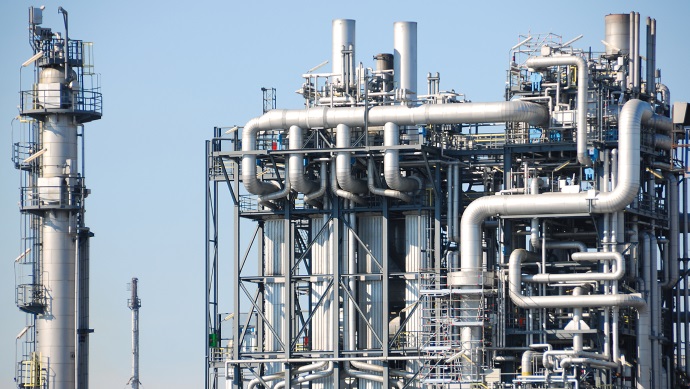One of the most important features of thermal oil plants is that they can provide process heat in a very large temperature range almost without any pressure. Additional advantages: They are lower maintenance, do not need any water treatment, can be very accurately controlled and are characterized – in comparison to steam – by lower investments (refer also to this blog article). For those reasons, the thermal oil technology is continually developing new application fields since centuries and is now used in almost all productive sectors. The variety of these industrial applications is very impressive. As of now, we present some interesting and important applications in irregular appearing articles. In this issue we start with the chemical industry.
Chemical industry
The chemical industry is one of the most important industries in Germany. In terms of turnover it is behind the vehicle construction and mechanical engineering just behind the electrical and electronics industry at fourth place, in terms of the persons employed at fifth place. The sector primarily produces intermediate goods for almost all production areas. The largest buyers are – beside the chemical industry itself – the rubber and plastics processing industry, private households (in particular on the demand for cleaning and care products), the textile, apparel and leather production, the automotive construction, the construction, the paper and printing industry, the metal production and the pharmaceutical industry (source: IG Bergbau, Energie, Chemie; Rammer; Legler und Krawczyk 2007).
In the chemical industry, the availability of process heat in the high temperature range plays an important role. Thermal oil systems, for example, are used for the heating of polymerization plants, poly-condensation plants, for spinning head heating and for manufacturing polyester fibres, but also in the sector of plastic extrusion, the temperature control of kneaders, dryers, suction filters and reactors.
Application: Reactor heating
At H&R AG, a manufacturer of chemical-pharmaceutical specialty products based on crude oil and precision plastic parts in Salzbergen/Germany, reactors serve for the production of highly purified paraffin for medical products. H&R (1.550 employees worldwide, annual turnover of more than 1 billion EURO) disposes of one of the oldest but at the same time most modern lubricant refinery of the world.
Together with heat 11, the company installed a new plant for the heat supply of two high-pressure hydrogenation plants in 2013. In this process, unusual solutions were found. True to its motto “Oil is far too good for burning!” the medium-sized chemical specialist processes crude oil to more than 800 different products. High value is set on the production plants being always on the latest state of the technology. The reactors newly installed in the course of a production expansion and increase in output of the two hydrogenation plants serve the production of highly purified paraffin and white oils for the pharmaceutical, cosmetics and food industry.
High process requirements
The used thermal oil plant for the heating of these reactors should work very efficiently and economically. Moreover, it had to observe very strict noise emission regulations since the refinery borders on a residential area. Matters were made worse by the fact that there was insufficient space for the installation. Furthermore, the plant had to be implemented smoothly into the existing plant structure and the available temperatures had to be controlled in a large range. An improved and easy handling as well as the obligatory 24/7 availability of the plant completed the challenging requirements profile.
Improved temperature control
The high demands for the temperature control were finally solved with a heat 11 thermal oil plant with gas-fired heater (heating capacity of 2.000 kW) the burner of which is characterized by an extremely large control range of 1:10. Besides the heater (boiler and combustion plant with control system), the entire plant consists of air-preheater, double pump skid, chimney and combined expansion and collection tank.
Despite of a high inflow temperature of 375 °C the thermal oil plant disposes of an efficiency above 90 %. This is reached by a combustion air preheating to 210 °C and an O2 control of the combustion process. Therminol 72 is used as heat transfer medium, an synthetic heat transfer fluid, which can be used in the range from -10 °C up to 380 °C.
Redundant design
According to the strict H&R factory regulations, the plant was designed redundantly and equipped with a volume flow control. Another remarkable feature was the construction of expansion and collection tank which were designed as combination tank. Thanks to the good cooperation of plant operator and manufacturer, the plant runs without any problems since more than two years following successful commissioning.
Further information
Project data
Interview with the operations manager of H&R, Erich Weitzel





Comments are closed.